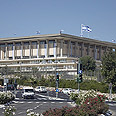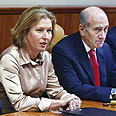
Time for change?
Photo: Ron Peled

Kadima's Olmert and Livni
Photo: AP
One upon a time when Israel was a brand new democracy its sclerotic political system worked reasonably well. Today with expanding population, power concentrated in the hands of a few, and the coalition hijacked by interest groups, the party list system of government has ceased to be viable.
With an election on the horizon, the need for real political change is urgent. I am not talking about whether we should elect Kadima, Likud or Labor, but rather, a real political change that would drastically alter the way we choose our leaders.
The current political system is a farce. We do not choose our leaders, have no direct input into the choice of candidates, and our Knesset does not attract the best to represent our interests.
Imagine this: It is election time in Israel. The political parties have candidates representing all districts in the country. There are real debates on issues affecting citizens in each constituency and you actually know the name of the candidates running for office. Imagine actually having a direct say in who you personally elect as a member of Knesset and choosing among individual candidates. In most parliamentary democracies this is how it works. The electoral districts elect a representative to the Knesset and you don’t vote for an unknown and unrepresentative slate of individuals.
Why reform our political system in Israel? There are many pundits on all sides of the political spectrum in this country who falsely believe that our current electoral process is democratic. This erroneous assumption is based on misconceptions of the democratic process and a desire to perpetuate the corruption in government. It is coupled by fear of losing power when in fact the opposite is true. A democratic country must have a legislature that is responsible, accountable to the people, and representative of the people. In the words of John F. Kennedy, “a government of the people, by the people and for the people.” Our current Israeli political system fails to achieve this ideal.
In order to achieve true democracy we need to make our politicians directly responsible to the electorate not through a political party list chosen by delegates at a convention, but rather, directly through the people. The best way to achieve this is a parliamentary system in which the country is divided into electoral districts based on demographics and regional topography. However it is understood that ethnic and religious disparity in Israel must be taken into account and in many instances the distribution of seats will automatically take this into consideration.
36 Torah sages
We can easily divide the country into eight regions: Golan, Galilee, Jerusalem, Binyamin, Gush Etzion, Shomron, Negev and Tel Aviv/Dan. Each of these areas should be divided into electoral districts which elect one representative or a block of representatives to the Knesset. The voters would have a direct say in who represents their district in the Knesset.The US republican system is not viable for adoption by Israel because the country is too small. Our goal must be to simplify rather than complicate our system. Therefore, the solution should be based on the British parliamentary model. The system works well in Canada both nationally and provincially.
My proposal for electoral reform in Israel is a bicameral system with two houses of legislature. The first a form of senate elected proportionally and the second similar to what is now the Knesset. The Senate would consist of 100 members. Thirty six would be Torah sages from all Orthodox streams of Judaism in Israel. The two chief rabbis would sit in the Senate for the duration of their term. Eighteen rabbis would be selected from both the ultra-orthodox and National-Religious camps.
The remaining 64 members would ideally be academics or respected leaders of the Israeli community elected in a manner similar to the current system but based on regions rather than a party list. The president would be selected from among the senate.
In conclusion, such electoral reform would ensure a more democratic system of government in Israel, allow for less abuse of power and greater accountability of our elected officials by the public. The reforms would permit us to choose who represents our interests and values; most importantly, the parties would truly become nationally based organizations with formulated policies on social, religious, economic and national security interests.
Let’s work together towards a ground breaking revolution in Israeli politics to ensure a better future for our state, ourselves and our future generations. After 60 years of independence, a government on the thin edge of democracy no longer suits our needs.
Daniel Ashkenazy is an educator and writer living in Jerusalem















